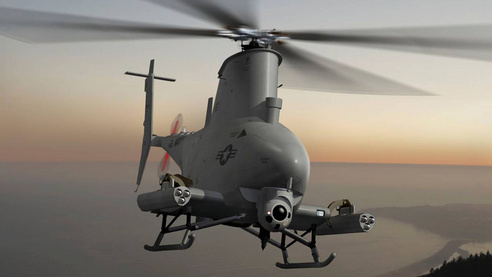By Kalwinder KaurSep 20 2012
BAE Systems has declared that the Advanced Precision Kill Weapon System (APKWS), for the first time, will be integrated onto an unmanned aerial vehicle. The guidance section of the laser-guided rocket was created and crafted by the company that has now received a U.S. Navy contract to integrate the APKWS onto the MQ-8B Fire Scout UAV.
 No Pilot Required – APKWS to arm unmanned bird
No Pilot Required – APKWS to arm unmanned bird
According to APKWS program manager at BAE Systems, Roy Rumbaugh, UAV platform will soon have the precision firepower of APKWS incorporated to it. The Fire Scout will use the innovative technologies of the company to create targets on land or at sea based on laser-guided accuracy, thereby ensuring safety of warfighters.
With intent to cater to a critical operational demand, the system is being incorporated onto the Fire Scout to address an emergency operational requirement and is being set up for instant deployment. Using its high fidelity, integrated flight simulator, BAE Systems will conduct system analyses and modeling on behalf of this rapid APKWS integration.
In addition to ensuring efficiency in a variety of missions that can be performed from surface ships, unmanned aircraft is capable of working in regimes, where manned aircraft operation is risky.
The APKWS marks the U.S. government's unique program of record for the 2.75-in long semi- active laser-guided rocket. The APKWS program’s initial operational test and evaluation phase was recently accomplished by the U.S. Marine aviators, thereby firing in counter to stationary and moving targets from AH-1W and UH-1Y helicopters. Since then, the APKWS system has been adopted in Afghanistan. BAE Systems will ship units to theater for deployment against insurgent forces.
Since 2006, BAE Systems has been serving as the APKWS prime contractor and has collaborated with the Direct and Time Sensitive Strike Program Office at the U.S. Naval Air Systems Command for development and delivery of the APKWS.
Disclaimer: The views expressed here are those of the author expressed in their private capacity and do not necessarily represent the views of AZoM.com Limited T/A AZoNetwork the owner and operator of this website. This disclaimer forms part of the Terms and conditions of use of this website.